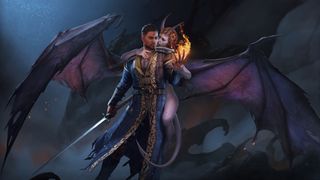D&D alignments suck. There, I said it. They suck in every edition of the tabletop game, but they particularly suck in D&D videogames. What a relief to hear Baldur's Gate 3 isn't using them at all.
For those unfamiliar, alignment is a sort of objective label for a D&D character's morality. Different editions have had different categories of alignment, but the one used most widely across the editions rates characters along an axis of lawful vs chaotic and good vs evil. A Lawful Good character is kind and just, and always follows the laws of the land as much as possible; a Chaotic Evil character follows their dark heart's desire, inflicting death and suffering whenever they wish. Characters can be neutral on one or both axes too. A Chaotic Neutral character believes in freedom and self-determination above all; a True Neutral (neutral to both) character seeks balance in all things; a Neutral Good character devotes themselves to… er, get back to me on that one.

It's a system that held on for a long time because of nostalgia and tradition, but it's always been awkward and reductive. It's restrictive enough to stifle nuanced character development, but vague enough that you're probably already getting angry at me about my interpretation of one of the alignments above. It's led to decades of idiotic arguments about the ethics of fantasy worlds—D&D's version of "Would you go back in time and kill Hitler as a baby?" is "Is it Lawful Good for a Paladin to kill a Chaotic Evil baby orc?", a hypothetical both incredibly tiresome and, infuriatingly, actually relevant to gameplay.
That's because in many of D&D's editions, alignment has been baked into the key rules of the game. It could restrict what class you could be—at one point all Druids had to be True Neutral, for example. It could affect what spells you could cast, or what effects certain spells would have on you. In the case of Paladins, straying from the Lawful Good alignment could lose you access to your class abilities, turning you into just a guy in inappropriately shiny armour. Which is why so many of them ended up in lengthy philosophical arguments with their Dungeon Masters.
In a videogame, there isn't even a DM to argue with—and developers have frequently struggled to implement alignment in a satisfying way. The nature of the system means games have to try and cover an absurd range of possible character viewpoints in their dialogue choices, and more often than not the result has been awkward and artificial moral choices.
Thanks for rescuing my cat from the tree, adventurer! Here's your 100 gold reward.
- [Lawful Good] Think nothing of it, citizen—and please, keep the gold.
- You're welcome, thanks for the gold.
- [Chaotic Evil] I only got your cat down so I could murder it—and you!!!

If orcs are born evil, does that mean good people should strive to wipe them out completely?
It's just not a flexible system for building nuanced and interesting choices around—and a big reason for that is because it's not a good reflection of how morality works, in the real world or in fiction. People simply don't fit into such neat categories. Worse, alignment for a long time has baked some seriously uncomfortable implications into D&D's world-building.
When you say that certain kinds of sapient beings are inherently good or evil from birth, whether you realise it or not you're making a pretty weird statement about right and wrong in your setting. Particularly in conjunction with D&D's historic use of the word 'race' instead of 'species', it's long drifted uncomfortably close to real-world discriminatory ideas that see certain groups in society as having innately negative traits while others are born superior.
In the real world, right and wrong are messy, subjective, and much argued over. By making good and evil literal, objective forces that every character is touched by, you then have to make some pretty sweeping decisions about what is always good and what is always evil. If orcs are born evil, does that mean good people should strive to wipe them out completely? Yes? Great, now our light-hearted fantasy world is pro-genocide!

The game can only benefit from not being straightjacketed by morality systems conceived 50 years ago.
It's problems like these that have led Wizards of the Coast to increasingly downplay the importance of alignment, starting with 4e and continuing into the most recent rules set, 5e, which has removed things like alignment restrictions on classes and innate alignments of races. As playtesting rolls on for the next update of 5e, signs seem to point to alignment being finally phased out entirely going forward, or at least turned into a vestigial optional element with no impact on gameplay or setting.
So it only makes sense that Baldur's Gate 3—based directly on 5e—has taken that step early, in collaboration with WOTC. With its aim of absurd levels of interactivity and narrative choice, the game can only benefit from not being straightjacketed by a morality system conceived 50 years ago. Larian is free to create its own, more nuanced story and world, and players can build whatever characters they want without being pigeonholed into certain personality types by their mechanical choices. Thank God—I'll never need to figure out whether it's morally appropriate for my True Neutral character to stack 10 explosive barrels next to an NPC before I attack them.

